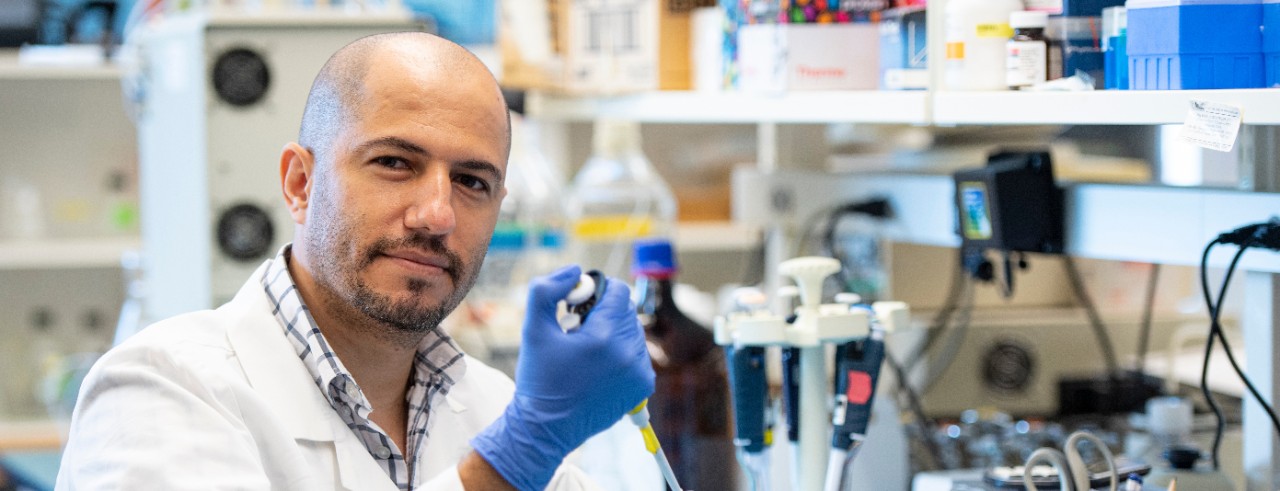
Researcher developing pancreatic cancer treatment that targets newly identified protein
MSN highlights Cancer Center trainee associate member
MSN highlighted the University of Cincinnati Cancer Center’s Ahmet Kaynak's research that examined the unique tumor microenvironment of pancreatic ductal adenocarcinoma cells, identified one of the key proteins that aids tumor treatment resistance and developed a new drug targeting this protein that reduced tumor size and increased survival in animal models.
The tumor microenvironment is the ecosystem that includes the tumor and surrounding immune cells, blood vessels and other tissue. Kaynak said PDAC’s microenvironment has unique characteristics that suppress the immune system’s ability to attack the cancer cells (causing immunosuppression), hinder drug delivery, and promote resistance to chemotherapy, radiotherapy and immunotherapy.
“There is an unmet need for the development of novel treatment approaches,” said Kaynak, PhD, a trainee associate member of the Cancer Center and postdoctoral fellow in the Hematology & Oncology Division of the Department of Internal Medicine in UC’s College of Medicine. “In this project, we asked the question of what the factors are that lead to immunosuppression in the tumor microenvironment.”
Kaynak and colleagues identified that a protein called Hsp70 contributes to tumor immunosuppression.
The team then developed a drug called SapC-DOPG that specifically targets cancer cells by binding to phosphatidylserine, a lipid on the cells’ surface. This work builds upon that of Kaynak’s mentor, Xiaoyang Qi, PhD, who developed a similar drug called SapC-DOPS that is currently in Phase 2 clinical trials as a lung cancer treatment.
SapC-DOPG was designed to target Hsp70 within PDAC cells. In animal models of PDAC, the drug was well tolerated and resulted in smaller tumor size and increased survival.
“We hope to transition to clinical settings and investigate whether SapC-DOPG can be used as a therapeutic agent in pancreatic cancer patients,” Kaynak said. “The safety of the analog SapC-DOPS has been proven in clinical trials with patients. We hope our novel drug can also be safely used in patients in the future.”
Read the original UC News story.
Featured photo at top of Kaynak in the lab. Photo/provided.
Related Stories
Researchers work to make blood cancer a manageable disease
September 17, 2025
During Blood Cancer Awareness Month, Spectrum News and MSN highlighted researchers in the University of Cincinnati Cancer Center’s Leukemia and Drug Development Lab working to make blood cancer a manageable illness and bring new treatments to patients more efficiently than ever before.
Breakthrough cancer trial offers hope for pancreatic cancer patients
March 25, 2025
Local 12 highlighted University of Cincinnati Cancer Center researcher Davendra Sohal and patient Ron Solomon who is enrolled in a pancreatic cancer trial targeting a genetic mutation called KRAS.
Researcher developing pancreatic cancer treatment that targets newly identified protein
September 30, 2025
MSN highlighted the University of Cincinnati Cancer Center’s Ahmet Kaynak's research that examined the unique tumor microenvironment of pancreatic ductal adenocarcinoma cells, identified one of the key proteins that aids tumor treatment resistance and developed a new drug targeting this protein that reduced tumor size and increased survival in animal models.
